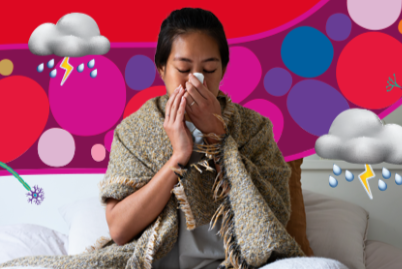-
We try our best to avoid getting sick at the best of times. But for expectant mothers, steering clear of the common cold or flu is even more important. Not only are pregnant women more susceptible to illness, they are at an increased risk of complications from the flu.
Here we explain why expectant mothers are at a higher risk of illness, and what steps you can take to help prevent sickness during pregnancy.
Avoiding cold and flu during pregnancy

Pregnancy and the flu
When you become pregnant, your immune response changes. This places expectant mothers at higher risk of suffering from common illnesses like coughs, colds and the flu. While coughs and colds can be managed relatively easily through upping fluid intake and letting the body rest, the flu is more serious and can affect your unborn child.
Flu-related complications during pregnancy can include pneumonia, damage to your heart, premature labour, and serious risk to your baby’s health.
If you’re pregnant and you think you may have caught the flu, contact your GP as soon as possible. Your doctor may take a swab test from your nose or throat to confirm a flu diagnosis and advise treatment, such as prescribing antiviral medicine, if appropriate.

Get your 2025 flu vaccine voucher
Redeem a 0-point flu vaccination voucher via the Live Better rewards store in the MyMedibank app that can be used at your local Amcal Pharmacy, Discount Drug Stores or Myhealth Medical Centre if doing so is right for you.*
How to help prevent flu during pregnancy
- Speak to your GP about getting vaccinated: According to the Australian Government, flu vaccinations are recommended for most people aged 6 months and older, including pregnant women. Not only does the flu vaccine they protect the mother during pregnancy, it will offer your baby some protection after birth as well. Speak to your GP or obstetrician about whether the flu vaccine is right for you.
- Wash your hands regularly: It's common knowledge, but washing your hands regularly helps prevent the spread of germs. It’s recommended that you wash your hands throughout the day, particularly when coming into contact with people who could be unwell, communal areas, and food.
- Rest: You’re always at higher risk of getting sick when your body is run down. During pregnancy, with an already lowered immune system, it’s even more important to get sufficient sleep and put your feet up when you can.
- Stay hydrated: Keeping your fluids up is important, whether you’re pregnant or not. Not only does it keep you hydrated throughout the day but it also allows your body to flush out any toxins.

24/7 Medibank Nurse Support
Medibank health insurance members can speak to a registered nurse at no extra cost.1 Chat over the phone or online, any time of the day or night.
1 Some referred services may involve out of pocket costs and waiting periods may apply.
Things you should know
* Must be 16 years or over to register for Medibank Live Better rewards. Some program partners and earning activities require a person to be at least 18 years of age to be eligible to earn and/or redeem a reward. Must be a Medibank member with hospital cover, extras cover, or hospital and extras cover, be up-to-date with premium payments and have signed up to Medibank Live Better rewards with My Medibank to earn Live Better rewards points for eligible purchases and redeem rewards. Rewards are subject to change without prior notice and are subject to availability. Excludes Overseas Student Health Cover (OSHC), Ambulance only cover, ahm covers and other selected covers. Live Better Management Pty Ltd, ACN 003 457 289 has entered into commercial arrangements with Medibank Live Better rewards program partners and may receive commissions. Additional terms and conditions may apply to the redemption of a reward depending on the type of reward chosen. See full Medibank Live Better rewards terms.
While we hope you find the information on this webpage helpful, please note that it is general in nature. It is not health advice, and is not tailored to meet your individual health needs. You should always consult a trusted health professional before making decisions about your health care. While we have prepared the information on the webpage carefully, we can’t guarantee that it is accurate, complete or up-to-date. And while we may mention goods or services provided by others, we aren’t specifically endorsing them and can’t accept responsibility for them. For these reasons we are unable to accept responsibility for any loss that may be sustained from acting on this information (subject to applicable consumer guarantees).
-
Choosing childcare that fits your family
Here’s what you need to know when choosing childcare
-
How to avoid 'dad bod'
How to keep fit and healthy with a new baby in the house
-
Expecting a baby during COVID-19
We address some common questions you may have.
-
How your extras can help during pregnancy
Use your cover to stay healthy
-
Pregnancy self-care essentials
Obstetrician Dr Chris Russell shares some advice.
-
Calculate your baby’s eye colour probability





